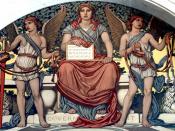IntroductionFiscal policy is the use of the government budget to affect an economy. When the government decides on the taxes that it collects, the transfer payments it gives out, or the goods and services that it purchases, it is engaging in fiscal policy. The primary economic impact of any change in the government budget is felt by particular groups. A tax cut for families with children, for example, raises the disposable income of such families. Discussions of fiscal policy, however, usually focus on the effect of changes in the government budget on the overall economy, on such macroeconomic variables as Gross Domestic Product (GDP) and unemployment and inflation.
Fiscal policy is usually summarized by looking at the difference between what the government pays out and what it takes in, which is the government deficit. Fiscal policy is said to be tight when the revenue is higher than the spending (the government budget is in surplus) and loose when spending is higher than the revenue (the budget is in deficit).
The most immediate impact of fiscal policy is to change the aggregate demand for goods and services. A fiscal expansion, for example, raises aggregate demand through one of two channels. First, if the government increases purchases but keeps taxes the same, it increases demand directly. Second, if the government cuts taxes or increases transfer payments, people's disposable income rises, and they will spend more on consumption. This rise in consumption will, in turn, raise aggregate demand.
Fiscal policy also changes the composition of aggregate demand. When the government runs a deficit, it could possibly meet some of its expenses by issuing government bonds. In doing so, it competes with private borrowers, financial institutes for money lent by savers, raising interest rates and crowding out some private investment. Therefore, a loose fiscal...


